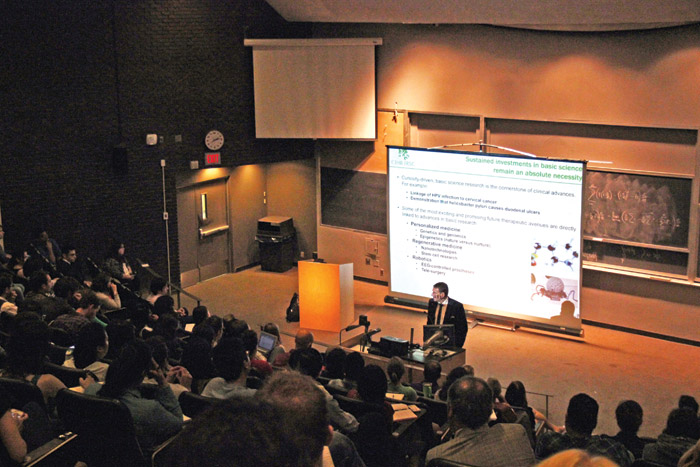Dr. Alain Beaudet, president of the Canadian Institutes of Health Research (CIHR), discussed the future of Canadian health research in an event hosted by the Post-Graduate Students’ Society (PGSS) on Sept. 26. The event was intended for graduate students seeking opportunities in academic and private medical research.
Beaudet began by explaining his thoughts on the current state of scientific research and healthcare in Canada.
“For those of you who wonder how we rank, we rank well,” he said. “[We] want to increase it. The problem is: Where we are absolutely great at science, we are not terribly great when it comes to delivering healthcare [….] You have to understand that our role is to produce the best possible science, but more and more the public is asking for an impact [in the healthcare system].”
The increasing costs of healthcare were also discussed. Beaudet outlined the paradox affecting medical research regarding healthcare costs.
“Right now, healthcare in this country costs over 200 billion dollars per year,” Beaudet said. “It accounts for almost 40 per cent of all provincial budgets, [which] is a huge burden. Yet research is still seen [as] a cost driver, and indeed, in some cases it is. But research is also the only way to be able to curb the costs.”
According to Beaudet, health research in Canada faces the challenge of accounting for the different realities experienced by Canada’s diverse populations. Beaudet specified that Indigenous peoples’ must be included in research processes.
“This is not acceptable in our country,” he said. “Canadian Inuits have the highest suicide rate in the world in young males. They have unbelievable rates of [type 2] diabetes in the aboriginal populations and in the North, increasing prevalence of tuberculosis.”
The role of the private sector in research was at the core of the presentation. Beaudet warned against financing universities through the private sector, saying that it would not only impact academic freedom but also limit the power of research in creating new industries. He also made suggestions regarding how partnerships could be formed to fund research.
“There is a paradox if the university serves an industry that already exists,” Beaudet said. “How are we going to generate new industries in that context? If the private sector can participate in the founding through partnerships—great [….] What I propose are similar partnerships for specific and narrow developments [applying] to medical research [and] devices: Applied science where the private sector has a genuine interest to invest [in]. It is nonsense that the public sector bears all the risks. That burden must be shared.”
Erin Strumpf, McGill professor of health economics, echoed Beaudet’s point of view.
“The distinction is essentially that the results from commercial research can be ‘commercialized,’ that is, sold in the hopes of making a profit,” Strumpf said. “That can happen with academic research, but usually the goal here is to increase knowledge, not to discover or develop something profitable.”
Strumpf continued to explain how the private and public sectors did not necessarily have the same incentives for conducting research, as some diseases only affect a small percentage of the population so that no one has the economic incentives to foster research.
“There is certainly the possibility for profit-earning health interventions, [such as] stents, CVD drugs, etc, but also areas that are unlikely to attract private-sector investment, [such as] orphan diseases, treatments and immunizations for diseases prevalent in poorer countries, etc,” Strumpf said. “Government funding can help support these areas where the private market fails, because research that might increase social welfare would not benefit private investors.”
Beaudet also encouraged the audience to promote scientific awareness.
“We need more people who understand science,” he said. “It is a little disappointing to see how few scientists there are in the House of Commons, for instance [….] You can have an appointment with your MP easily and just talk about science. Tell them what you are doing.”
According to PGSS VP External Affairs Julien Ouellet, McGill is likely to play a role in generating a conversation among the different actors of the medical research field.
“Virtually all graduate students know that the world of research is changing, for better or for worse.” he said. “Considering the success of this event, our executive hopes to attract the presidents of the other two granting agencies: The Social Sciences and Humanities Research Council of Canada (SSHRC) and the Natural Sciences and Engineering Research Council of Canada (NSERC) [….] We hope that by pooling our resources with the other Montreal based universities, we might create winning conditions to convince them to address our members.”








